L-Theanine for Calm Focus and Mood Stability
Introduction
In a world full of constant notifications, caffeine, and mental overload, it’s easy to feel overstimulated — or worse, anxious and unfocused. Many people reach for coffee to get through the day, but that same caffeine can trigger restlessness or mood swings.
Enter L-Theanine — an amino acid naturally found in green tea that promotes calm focus, mental clarity, and emotional balance 🌿.
It’s one of the few natural compounds that can relax the mind without causing drowsiness, making it ideal for modern-day stress, anxiety, and cognitive fatigue.
Let’s explore how L-theanine works, what the science says about its effects on mood and focus, and how to use it safely and effectively to create a more centered, peaceful mind.
Looking for supplements for Brain Fog? Click here.
🌿 What Is L-Theanine?
L-Theanine is a non-protein amino acid found almost exclusively in tea leaves, especially in green tea (Camellia sinensis). It’s also present in certain types of mushrooms.
This compound gives green tea its unique calming-yet-alert feeling — that smooth, steady energy that doesn’t crash like coffee ☕.
Chemically, L-theanine resembles glutamate, a neurotransmitter involved in learning and memory. But instead of overstimulating the brain, it gently modulates excitatory activity, promoting balance and mental composure.
💡 Think of L-theanine as the “zen molecule” — it helps your mind stay clear and calm, even under pressure.
🧠 How L-Theanine Affects the Brain
L-theanine crosses the blood-brain barrier within 30–60 minutes after ingestion and starts influencing several key neurotransmitters.
🧬 Boosts Alpha Brain Waves
One of L-theanine’s hallmark effects is its ability to increase alpha wave activity — the brainwave pattern associated with relaxed alertness, creativity, and flow states.
🧘 Alpha waves appear when you’re calm but focused — like during meditation or creative work.
Studies using EEG (electroencephalography) show that within 40 minutes of taking L-theanine, alpha wave activity increases significantly — without sedation.
✨ This means you can feel peaceful and productive at the same time.
🌸 Modulates Neurotransmitters
L-theanine subtly adjusts several neurotransmitters linked to mood, stress, and cognition:
Increases GABA: Enhances relaxation and reduces anxiety.
Balances dopamine: Supports motivation and reward sensitivity.
Regulates serotonin: Stabilizes mood and emotional tone.
Reduces glutamate overstimulation: Protects neurons from excitatory stress.
🧠 The result is smoother communication between brain regions — promoting emotional stability, clear focus, and calm motivation.
⚙️ Lowers Cortisol and Physiological Stress
Chronic stress elevates cortisol, a hormone that can lead to fatigue, irritability, and poor focus.
L-theanine has been shown to reduce cortisol levels during stressful tasks.
💬 For example, in one study, participants who took 200 mg of L-theanine before a stressful event showed lower heart rate and blood pressure responses compared to those taking a placebo (Biological Psychology, 2007).
🌿 Translation: You stay cool under pressure — literally.
☕ L-Theanine and Caffeine: The Perfect Combo

If you’ve ever had a cup of high-quality green tea and felt both awake and calm, you’ve experienced the magic of L-theanine + caffeine synergy.
L-theanine smooths out caffeine’s jagged edges, enhancing alertness without causing jitteriness or anxiety.
🧩 How They Work Together
Caffeine increases alertness by blocking adenosine receptors.
L-theanine increases alpha waves and GABA, balancing caffeine’s stimulation.
🌿 Research Insight
A Nutritional Neuroscience (2008) study found that participants who took L-theanine (200 mg) plus caffeine (50 mg) performed better on attention-switching tasks and felt less mental fatigue than those taking caffeine alone.
💡 Ideal combo: 100–200 mg L-theanine + 50–100 mg caffeine (about one cup of coffee or strong green tea).
Looking for supplements for Brain Fog? Click here.
🌞 L-Theanine for Mood Stability
💬 Stress and Anxiety Relief
L-theanine’s ability to modulate GABA, serotonin, and dopamine gives it mild anxiolytic (anti-anxiety) properties.
In a 2016 randomized controlled trial published in Pharmacology, Biochemistry & Behavior, daily supplementation of 200 mg L-theanine significantly reduced anxiety and improved sleep quality in people exposed to chronic stress.
Participants reported:
Reduced nervous tension
Less irritability
Improved calm focus during the day
🌿 Unlike sedatives, L-theanine doesn’t cause drowsiness or dependence — it gently recalibrates the nervous system.
💛 Depression and Emotional Balance
While not a treatment for depression, L-theanine may support emotional regulation and complement existing therapies.
A 2019 Journal of Affective Disorders study showed that 8 weeks of L-theanine (250 mg/day) improved sleep, anxiety, and cognitive function in individuals with mild depressive symptoms.
💬 The effect was subtle but meaningful — participants felt calmer, clearer, and more in control of their thoughts.
🧘 L-Theanine for Focus, Productivity, and Flow
L-theanine enhances executive function — your brain’s ability to plan, focus, and filter distractions.
In high-demand settings (students, professionals, creatives), this amino acid can:
Increase focus and attention span
Improve task-switching ability
Reduce “mental noise” and overthinking
⚡ Science Spotlight
A 2021 Nutrients study found that L-theanine (200 mg/day) improved attention, memory accuracy, and mental alertness in healthy adults under stress.
When combined with caffeine, it improved reaction time and working memory even further — without increasing anxiety.
🧘 It’s like mindfulness in capsule form — focus without tension.
🌙 L-Theanine and Sleep Quality
Because L-theanine promotes relaxation and lowers nighttime cortisol, it can improve sleep onset and depth, especially when stress is the barrier.
💤 Study Insight
A Nutrients (2019) review found that L-theanine (200–400 mg before bed):
Shortened time to fall asleep
Increased sleep efficiency
Reduced nighttime anxiety
🌿 Best part: It enhances deep sleep without causing next-day grogginess — unlike melatonin or sedatives.
💊 Try pairing it with magnesium glycinate or GABA for a gentle nighttime calm.
🧩 The Neuroprotective Side of L-Theanine
Beyond calmness and focus, L-theanine has long-term brain-protective effects.
🔬 Mechanisms
Reduces oxidative stress in neurons
Supports mitochondrial function
Prevents excitotoxicity (damage from excessive glutamate)
Promotes neurogenesis (growth of new neurons)
A 2018 Frontiers in Neuroscience review suggested that L-theanine might even protect against age-related cognitive decline, due to its antioxidant and anti-inflammatory actions.
🧠 It’s not just for stress — it’s brain longevity in action.
🍃 Dosage and How to Use L-Theanine
⚖️ Recommended Doses
| Purpose | Dosage | Timing |
|---|---|---|
| Calm focus | 100–200 mg | Morning or midday |
| Stress relief | 200–300 mg | With or after meals |
| Sleep support | 200–400 mg | 30–60 min before bed |
| Paired with caffeine | 100–200 mg L-theanine + 50–100 mg caffeine | Morning or pre-work |
💡 Start low (100 mg/day) and increase gradually as needed.
🍵 Natural Sources
Green tea (especially matcha)
Black tea and white tea (less concentrated)
Certain mushrooms (small amounts)
☕ 1 cup of green tea ≈ 20–30 mg of L-theanine
For therapeutic effects, supplementation is typically required — tea alone won’t provide enough.
⚠️ Safety and Side Effects
L-theanine is considered extremely safe — even at high doses (up to 1200 mg/day in studies).
🌿 Common Reactions
Mild relaxation (desired effect)
Occasional drowsiness if taken on an empty stomach
⚠️ Avoid combining L-theanine with:
Strong sedatives (benzodiazepines, sleep meds)
Alcohol (can amplify sedation)
Pregnant or breastfeeding women should consult a healthcare provider before use.
💬 L-theanine is non-addictive, non-habit-forming, and well-tolerated — even for long-term use.
🧘 Combining L-Theanine with Other Natural Mood Supporters
L-theanine works beautifully in synergy with other calming and focus-enhancing nutrients:
| Nutrient | Synergy | Benefit |
|---|---|---|
| Magnesium Glycinate | Enhances GABA | Deep calm and relaxation |
| Rhodiola Rosea | Improves energy and stress resilience | Calm alertness |
| Ashwagandha | Lowers cortisol | Sustained calm focus |
| Omega-3s (EPA/DHA) | Reduces inflammation | Balanced mood |
| B Vitamins (B6, B12, Folate) | Neurotransmitter support | Stable emotional tone |
| NAC or CoQ10 | Antioxidant synergy | Cognitive clarity |
💡 Stack example:
Morning → L-theanine + caffeine + B-complex
Evening → L-theanine + magnesium glycinate
🌬️ Breathwork and L-Theanine: The Ultimate Calm Combo

L-theanine enhances your brain’s alpha rhythm, similar to what’s achieved during meditation or controlled breathing.
Pairing it with breathwork amplifies the effect — helping you slip into calm focus within minutes.
🌫️ Try This “Focus Breath”:
Inhale through your nose for 4 seconds.
Hold for 1 second.
Exhale slowly through your mouth for 6 seconds.
Repeat for 3 minutes.
🌿 Do this after taking L-theanine to help your nervous system settle into “flow mode.”
Want to try Breathwork? Click Here.
🧩 L-Theanine and the Gut-Brain Axis
Your gut produces about 90% of your serotonin — and L-theanine may help keep that system balanced.
Studies show that it can support gut microbiota diversity and reduce inflammation that affects mood.
💬 This may partly explain why L-theanine users often describe feeling “light” and mentally unburdened — it soothes both the gut and the brain.
🌈 Real-World Results
Example 1:
Sara, a graduate student, struggled with racing thoughts and test anxiety. After taking 200 mg of L-theanine before study sessions, she noticed:
Better concentration
Reduced anxiety
Smoother caffeine experience
Example 2:
Mark, a 42-year-old entrepreneur, used L-theanine to balance coffee crashes.
💬 “It helped me focus longer without tension. It’s like being alert, but calm inside.”
These stories echo what research has confirmed — L-theanine helps you find that sweet spot between calmness and productivity.
🌞 L-Theanine and Long-Term Brain Health
Beyond mood and focus, regular use of L-theanine may contribute to neuroprotection.
By reducing oxidative stress and inflammation, it may help protect against:
Cognitive decline
Anxiety-related brain changes
Sleep disruption due to chronic stress
🧠 The calmer your brain operates, the less wear-and-tear it experiences.
🧘 Key Takeaways
✅ L-theanine promotes calm alertness by increasing alpha brain waves.
✅ Supports mood stability through GABA, serotonin, and dopamine modulation.
✅ Reduces stress and cortisol without sedation.
✅ Enhances focus and productivity, especially when paired with caffeine.
✅ Improves sleep quality and emotional resilience.
✅ Safe, non-habit-forming, and gentle enough for daily use.
💬 L-theanine helps you feel like yourself — just steadier, calmer, and clearer.
Looking for online therapy ? Click Here.
📚 References
Kimura, K., et al. (2007). “Effects of L-theanine on stress-related symptoms and cognitive function in humans.” Biological Psychology, 74(1), 39–45.
Hidese, S., et al. (2019). “Effects of chronic L-theanine administration on stress-related symptoms and cognitive functions.” Journal of Affective Disorders, 246, 199–207.
Rogers, P. J., et al. (2008). “Effects of caffeine and L-theanine on alertness and cognitive performance.” Nutritional Neuroscience, 11(4), 193–198.
Yokogoshi, H., et al. (1998). “Effect of theanine on brain serotonin and dopamine levels.” Bioscience, Biotechnology, and Biochemistry, 62(4), 816–818.
Juneja, L. R., et al. (1999). “L-theanine: A unique amino acid of green tea and its relaxation effect.” Trends in Food Science & Technology, 10(6–7), 199–204.
Unno, K., et al. (2020). “L-theanine supplementation improves sleep and mood under stress.” Nutrients, 12(2), 447.
Unno, K., et al. (2018). “Tea catechins and L-theanine in brain health: Evidence and mechanisms.” Frontiers in Neuroscience, 12, 600.
Haskell, C. F., et al. (2008). “The combined effects of L-theanine and caffeine on cognitive performance and mood.” Biological Psychology, 77(2), 113–122.
Related Posts
-

Nootropics That Promote Calm and Rest
Explore the world of calming nootropics — natural brain enhancers that promote relaxation, better focus, and deeper rest. Learn how L-Theanine, magnesium, ashwagandha, and other adaptogens help balance your nervous system, reduce stress, and support restorative sleep.
-

Best Natural Supplement Stack for Sleep
Discover the best natural supplement stack for deep, restorative sleep. Learn how nutrients like magnesium, L-theanine, glycine, and calming herbs such as chamomile and ashwagandha work together to relax your body, calm your mind, and improve sleep quality—naturally and safely.
-

Combining L-Theanine and Magnesium for Sleep: A Calm Night, Naturally
Discover how combining L-Theanine and Magnesium can help you drift into deep, restorative sleep. Learn how this natural duo calms the mind, relaxes the body, and supports your nervous system—without grogginess the next morning.
-

How to Sleep Better After Intense Workouts
Struggling to fall asleep after a tough workout? Learn how to optimize your post-training recovery with nutrition, hydration, and science-backed sleep strategies. Discover how to calm your nervous system, balance hormones, and wake up fully recharged for your next session.
-

Ashwagandha and Valerian: A Bedtime Combo for Deep Rest and Emotional Reset
Discover the calming synergy of Ashwagandha and Valerian root, two natural sleep aids that help quiet the mind, ease anxiety, and promote deeper rest. Learn how this herbal duo supports the nervous system, balances stress hormones, and restores emotional peace — without next-day grogginess.
-

How to Create a Resilience-Boosting Diet
Discover how to build emotional and physical strength from the inside out with a resilience-boosting diet 🍎. Learn which foods stabilize your mood, how supplements like magnesium and omega-3s strengthen your stress response, and why pairing nutrition with breathwork and therapy creates lasting calm, focus, and vitality 🌿💪.
-

Best Teas and Herbal Blends for Calmness: Nature’s Way to Restore Inner Peace
Ashwagandha, the ancient adaptogenic herb, helps your body find balance during stress. Known as “Indian ginseng,” it supports cortisol regulation, boosts energy, and restores calm clarity. Discover how this powerful root promotes resilience, emotional balance, and steady vitality — one cup at a time. 🌸
-

Parenting and Emotional Strength: How to Raise Children Without Losing Yourself
Empathy is the bridge that connects hearts — the quiet power to understand, feel, and support another’s emotions without judgment. Learn how empathy strengthens relationships, enhances communication, and cultivates deeper compassion in everyday life. 🌿
-

How to Bounce Back from Public Failure: Reclaiming Confidence, Purpose, and Power
Visualization is more than imagination — it’s brain training for resilience. By picturing calm, success, or healing, you activate the same neural pathways as real experience. Learn how daily visualization rewires your brain for confidence, emotional balance, and recovery from stress. ✨
-

Coping with Financial Stress Through Resilience: How to Stay Grounded When Money Feels Tight
Body awareness is the foundation of emotional resilience. By tuning into your body’s signals — tension, fatigue, or calm — you learn to recognize stress before it overwhelms you. Discover how mindfulness, gentle movement, and breathwork can deepen your connection with your body and restore balance from the inside out. 🧘
-

How to Stay Positive During Chronic Illness: A Guide to Emotional Strength and Hope
Creativity is more than art — it’s a form of healing. Whether through painting, writing, music, or small acts of expression, creativity helps release emotion, calm the nervous system, and reconnect you to joy. Discover how to use creativity as a tool for emotional balance, resilience, and self-discovery. 🌿
-

Resilience Tips for Caregivers: How to Stay Strong While Caring for Others
Joy isn’t the absence of pain — it’s the quiet strength to find light even in challenging times. Cultivating joy through small daily moments restores balance, releases stress, and reminds you of life’s beauty. Learn how to reconnect with authentic happiness, rebuild emotional energy, and nurture your nervous system through gratitude, presence, and play. 🌿
-

Building Resilience After a Breakup: How to Heal, Rebuild, and Rise Stronger
Social connection is one of the strongest predictors of emotional resilience. During difficult times, genuine relationships act as anchors — calming the nervous system, reducing stress hormones, and helping you regain perspective. Learn how cultivating real human connection can strengthen your mind, heart, and overall well-being. 🌿
-

How to Stay Emotionally Strong During Job Loss
Your emotions are powered by brain chemistry — a delicate balance of neurotransmitters like serotonin, dopamine, and cortisol. When these chemicals work in harmony, you feel calm, focused, and resilient. Learn how daily habits, nutrition, and mindfulness can support your brain chemistry and boost emotional well-being naturally. 🌿
-

The Role of Hormones in Emotional Stability: How Your Chemistry Shapes Your Calm
Hormones shape more than your body — they shape your emotions, resilience, and sense of calm. From cortisol to serotonin, these chemical messengers influence how you react to stress, connect with others, and recover from challenges. Learn how to balance your hormones naturally to build lasting emotional stability and harmony within. 💫
-

Mitochondria and Emotional Energy: The Cellular Power Behind Your Mood
Breathwork is one of the most powerful tools for emotional regulation and cellular balance. Through intentional breathing, you can calm your nervous system, increase oxygen flow to the brain, and even support mitochondrial energy. Learn how conscious breathing connects body and mind — transforming stress into presence and emotional strength. 🌿
-

Inflammation and Its Impact on Mood Resilience: The Silent Link Between Body and Mind
Inflammation doesn’t just affect the body — it impacts the mind. Chronic inflammation alters brain chemistry, depletes serotonin, and makes emotional recovery harder. Learn how calming inflammation through nutrition, mindfulness, and sleep can restore balance, resilience, and a renewed sense of emotional strength. 💫
-

How Antioxidants Protect Emotional Well-being: The Hidden Link Between Oxidative Stress and Mental Health
Antioxidants do more than protect your body — they defend your mind. By neutralizing oxidative stress, antioxidants support serotonin, dopamine, and brain energy pathways that keep you calm, focused, and emotionally balanced. Discover how foods like berries, green tea, and dark chocolate nourish your brain, boost mood, and strengthen resilience from the inside out. 🌿✨
-

The HPA Axis and Emotional Health: The Hidden Bridge Between Stress and Mind
Neuroplasticity — the brain’s ability to rewire and adapt — is the foundation of emotional healing and resilience. When you face stress, trauma, or change, your neural pathways can reshape themselves to support new patterns of calm, focus, and self-awareness. Learn how daily practices like mindfulness, therapy, and breathwork strengthen neuroplasticity to transform emotional pain into personal growth. 🌸
-

Why Cortisol Control Is Key to Resilience: Mastering Stress to Build Emotional Strength
Controlling cortisol — the body’s main stress hormone — is the secret to lasting resilience. When cortisol levels stay balanced, your mind becomes clearer, emotions steadier, and energy more sustainable. Learn how breathwork, mindset shifts, adaptogens, and daily rhythms can help you calm your stress response and build true inner strength. 🌞💪
-

Dopamine’s Influence on Motivation and Recovery: Reigniting Drive and Balance
Healthy relationships are the foundation of emotional balance and resilience. Whether romantic, familial, or platonic, genuine connection releases dopamine, serotonin, and oxytocin — the brain’s “bonding trio” — helping us feel secure, motivated, and seen. Learn how trust, empathy, and communication not only strengthen your connections but also reshape your nervous system for deeper emotional well-being. 🌿🤝
-

The Role of Serotonin in Resilience: How This “Mood Molecule” Shapes Emotional Strength
Serotonin — often called the “resilience molecule” — plays a vital role in how we handle stress, regulate mood, and recover from emotional challenges. Beyond happiness, this powerful neurotransmitter helps balance the gut-brain axis, stabilize the nervous system, and support emotional flexibility. Learn how nutrition, sunlight, mindfulness, and adaptogens can naturally boost serotonin and strengthen your emotional resilience. 🌞🧠
-

How Neuroplasticity Supports Emotional Growth: Rewiring the Brain for Resilience
Neuroplasticity is the brain’s built-in power to grow, adapt, and heal — and it’s the foundation of emotional transformation. Every mindful breath, compassionate act, or reframed thought strengthens new neural pathways that support resilience and self-awareness. Learn how your brain rewires through daily habits, helping you turn emotional challenges into opportunities for growth and calm. 🌿
-

Tai Chi and Adaptogens for Mind-Body Balance: The Art of Harmonizing Energy and Resilience
Alchemy isn’t just an ancient science — it’s a timeless symbol of transformation and inner balance. By blending the physical and spiritual, alchemy teaches us that change begins from within. Just as metals are refined into gold, we too can transmute emotional pain, stress, and chaos into clarity and strength through mindful practice and self-awareness. 🌙✨
-

Cold Therapy and Emotional Control: Training the Mind Through the Body
Cold therapy isn’t just for athletes — it’s a tool for emotional mastery. By exposing your body to controlled cold, you train your nervous system to stay calm under stress, improving focus, mood, and resilience. This article explores the science of cold exposure, its impact on hormones and the vagus nerve, and how ice baths and cold showers can help you build emotional control, one breath at a time. 🧊🧘♂️
-

How Music Influences Emotional Recovery: The Healing Soundtrack of the Mind
Neuroplasticity — the brain’s ability to rewire and heal itself — is at the heart of emotional recovery. Through mindful habits, music, therapy, and consistent mental stimulation, your brain can form new connections that support resilience and well-being. Discover how neuroplasticity turns pain into growth, helping you rebuild balance, focus, and emotional strength. 🌿
-

Nature Therapy for Building Resilience: Reconnecting With the Healing Power of the Earth
Nature therapy helps rebuild emotional resilience by reconnecting you with the healing rhythms of the Earth. From forest walks to sunlight exposure, nature restores balance to your nervous system, lowers stress hormones, and teaches emotional adaptability. Learn how spending time outdoors can enhance mental clarity, calm anxiety, and awaken your natural capacity to heal. 🌞
-

Breathwork Techniques That Pair with Supplements: The Ultimate Synergy for Stress Relief and Mental Clarity
Breathwork and supplements create a powerful mind-body synergy for stress relief, focus, and energy. By combining intentional breathing with adaptogens, nootropics, and calming nutrients, you can naturally regulate cortisol, sharpen mental clarity, and boost emotional balance. This guide explores the best breathwork techniques and supplement pairings to help you feel centered, calm, and energized from the inside out. 🌿
-

Why Cortisol Balance Matters for Emotional Strength
Balancing cortisol — your body’s main stress hormone — is essential for emotional resilience. When cortisol is chronically high, your mind stays stuck in survival mode, leading to fatigue, anxiety, and emotional instability. This article explores how nutrition, supplements, breathwork, and therapy can help restore healthy cortisol rhythms, regulate the nervous system, and strengthen your ability to handle life’s challenges with calm focus and emotional strength. 🌿
-

Best Supplements for Students During Exam Season: Focus, Energy, and Memory Support
Studying late into the night? Learn which natural supplements can boost focus, memory, and mental stamina during exam season — without the crash. From omega-3s to Bacopa and Rhodiola, discover your brain’s ultimate exam support stack. 🎓🧠
-

Natural Memory Boosters for Seniors: How to Keep Your Mind Sharp and Focused
Stay mentally sharp and confident as you age. Discover science-backed natural supplements and lifestyle habits that boost memory, focus, and brain longevity for seniors. 🌿🧠
-

The Link Between Stress, Cortisol, and Memory Loss
Chronic stress can quietly erode your memory — and cortisol is the key culprit. Learn how stress hormones affect the brain, why the hippocampus shrinks under pressure, and how natural strategies can help you restore memory and mental clarity. 🧠✨
-

How to Build a Daily Supplement Routine for Memory Health
Want to sharpen your memory and stay mentally clear? Learn how to build a daily supplement routine for memory health — from morning focus to nighttime brain repair. Discover science-backed nutrients that boost recall, focus, and long-term cognitive resilience. 🧠🌿
-

Top 5 Natural Supplements for Memory Recall and Focus
Looking to boost memory and concentration naturally? Discover the top 5 supplements — Bacopa, Ginkgo Biloba, Lion’s Mane, Rhodiola, and Phosphatidylserine — that enhance focus, recall, and long-term brain health. 🧠✨
-

Top Supplements to Balance Mood Naturally
From omega-3s to adaptogens, discover the top natural supplements proven to support emotional balance, reduce stress, and promote inner calm — safely and effectively. 🌿✨
-
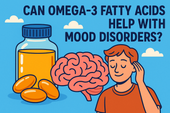
Can Omega-3 Fatty Acids Help with Mood Disorders?
Omega-3 fatty acids do more than support heart health — they can help balance mood, reduce depression, and calm anxiety. Discover how EPA and DHA nourish your brain, fight inflammation, and support emotional well-being from within. 🌊🧠
-

Vitamin D and Mood: The Sunshine Vitamin for Emotional Balance
Could the key to emotional balance be as simple as a little sunlight? Discover how vitamin D — the sunshine vitamin — influences serotonin, reduces inflammation, and helps you feel more positive and resilient year-round. ☀️💛
-

The Role of Magnesium in Reducing Irritability and Low Mood
Feeling on edge or emotionally drained? Magnesium could be the missing link between your body and your mood. Discover how this essential mineral reduces irritability, balances neurotransmitters, and helps your nervous system find calm again. 🌿✨
-
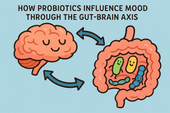
How Probiotics Influence Mood Through the Gut-Brain Axis
Discover how probiotics can do more than support your digestion—they can actually uplift your mood. This article explores the fascinating gut-brain axis and how balancing your gut bacteria through probiotics may help reduce anxiety, improve emotional stability, and support long-term mental well-being. 🌿🧠
-
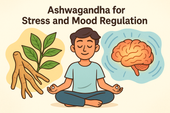
Ashwagandha for Stress and Mood Regulation
Discover how Ashwagandha, the powerful adaptogenic herb 🌿, helps your body manage stress and regulate mood. Learn how it balances cortisol, boosts GABA and serotonin, and supports emotional stability — helping you feel calm, focused, and resilient every day.
-
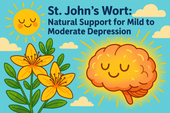
St. John’s Wort: Natural Support for Mild to Moderate Depression
Discover how St. John’s Wort, the “sunshine herb” 🌼, naturally supports mild to moderate depression. Learn how it boosts serotonin, balances mood, and promotes emotional resilience — with research showing its effectiveness compares to antidepressants, but with fewer side effects.
-
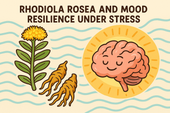
Rhodiola Rosea and Mood Resilience Under Stress
Discover how Rhodiola rosea helps your body adapt to stress 🌿. Learn how this powerful adaptogen balances cortisol, supports serotonin and dopamine, and strengthens emotional resilience — helping you stay calm, focused, and energized under pressure.
-

Chamomile and Lavender: Herbal Calm for Emotional Fluctuations
Discover how chamomile and lavender bring calm to emotional ups and downs 🌿. Learn how these two soothing herbs balance your nervous system, ease anxiety, and support restful sleep — naturally helping you find peace and emotional stability.
-
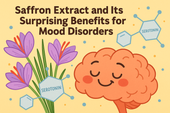
Saffron Extract and Its Surprising Benefits for Mood Disorders
Discover how saffron extract — the golden spice of joy 🌸 — can naturally support mood balance, ease anxiety, and lift mild depression. Learn what science says about its serotonin-boosting power, the ideal dosage, and how this ancient remedy compares to modern antidepressants.
-
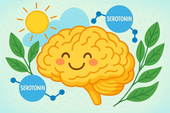
5-HTP and Serotonin: A Natural Path to Lifting Mood
Discover how 5-HTP naturally boosts serotonin 🌞 — the neurotransmitter behind mood, sleep, and emotional balance. Learn how this plant-derived compound supports happiness, reduces anxiety, and improves rest by helping your brain create more serotonin the gentle, natural way.
-
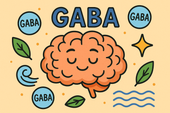
GABA Supplements for Reducing Anxiety and Mood Swings
Discover how GABA supplements can help reduce anxiety and balance mood naturally 🌿. Learn how this calming neurotransmitter works to quiet the mind, ease stress, and improve sleep — plus which nutrients and habits can boost your body’s own GABA production for long-term emotional stability.
-
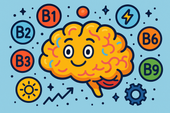
B Vitamins and Brain Chemistry: Supporting Energy and Emotional Balance
Discover how B vitamins power your brain chemistry ⚡. Learn how B6, B9, and B12 support serotonin, dopamine, and energy production — helping boost focus, mood, and emotional balance. From diet to supplements, explore how this vital nutrient group keeps your mind resilient and your energy steady.
-

N-Acetyl Cysteine (NAC) and Mood Disorders: What the Research Says
Learn how N-Acetyl Cysteine (NAC) supports brain health and mood balance 🧠. Discover how this antioxidant helps reduce oxidative stress, regulate glutamate, and improve emotional stability in depression, bipolar disorder, and anxiety — backed by cutting-edge psychiatric research.
-

Supplements for Bipolar Disorder: What May Support Stability
Discover the best supplements for bipolar disorder 🌿 that may support emotional stability and brain health. Learn how nutrients like omega-3s, magnesium, vitamin D, and NAC can help reduce inflammation, balance neurotransmitters, and complement traditional treatment safely.

















































